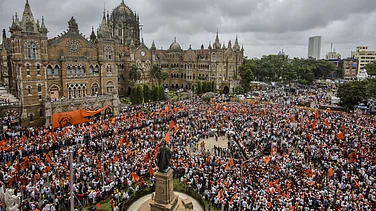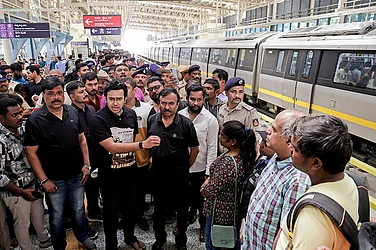MR Slippery Eel, i.e. P.V. Narasi-mha Rao, has wriggled out of many a leadership battle, but on Friday last week, one of his key, and trusted, men stabbed him in front of the Congress Parliamentary Party (CPP) which had assembled to discuss, among other things, the issue of corruption. Perhaps the perception that the Congress had become a thoroughly corrupt party began when Rao, as Prime Minister, asked his MPs to bail out Justice Ramaswami, who was facing an impeachment motion in the Lok Sabha on grounds of corruption, months after his government survived the '93 no-trust vote.
The five MPs, at whose instance the CPP meet was called, had a surprise supporter in erstwhile finance minister Manmohan Singh who sent a strong message that a leadership under a cloud of suspicion does not command the party's support. "The Sukh Ram episode has come as a setback to our image. There should be a permanent mechanism within the party to scrutinise corruption charges. But Caesar's wife should be above suspicion," he said.
Drawing a firm line between loyalty and sycophancy, Manmohan Singh made it clear that he would not sacrifice his "Mr Clean" image—as a bureaucrat, planner and politician—even to shield Rao. This outburst could very well trigger the beginning of the end for Rao as Congress party leader as he struggles to clear his name in a string of corruption charges.
Detractors could very well use the corruption missile to hit back at Rao—there has already been an oblique demand for his resignation. Rao loyalist and party general secretary R.K. Dhawan made a feeble attempt to initiate disciplinary action against the five potential 'rebels'—Ashok Gehlot, P.R. Das Munshi, Tariq Anwar, A.C. Jose and Bhupinder Huda—but in vain. The next day, in a counter-offensive, Youth Congress President M.S. Bitta, spoke out for Rao and sought their expulsion again.
At the CPP meet, support for Rao came from former speaker Shivraj Patil: "Corruption is not Congress specific. It is there in all parties. There should be a collective introspection." But Patil's feeble defence only bolstered the dissidents. "The issue cannot be swept beneath the carpet any more. We will not tolerate corrupt leaders," Tariq Anwar told Outlook.
Das Munshi, speaking on behalf of the five signatories, demanded that "any member of the party who is chargesheeted on charges of corruption will not hold any office at any level and not contest any election till he is cleared of all the charges". He further demanded a party committee, comprising people with a clean image like Singh and A.K. Antony, to examine charges of corruption against leaders so that it could restore the people's faith in the party.
Rao did not put Das Munshi's resolution to vote as he knows its implications—if certain hawala-tainted Congress leaders were denied party tickets, Rao should not have been an exception. Also, the party would stand exposed as a votary of corruption—the Ramaswami impeachment case is an example—had the resolution been put to vote. Das Munshi is adamant: he wants to bring up the resolution at the upcoming AICC session in October.
At the 105-minute meeting, Rao deliberately chose not to respond to the corruption charges against many Congress leaders, including himself, and all that he seemed interested in was to allow the members to let off steam. In fact, at the post-meeting briefing, Suresh Kalmadi, CPP secretary, said: "There were no fireworks, nor was there a demand for Rao's resignation from any quarters, including those five".
That pressure is building up on Rao was clear when he gave the go-ahead for an AICC session, sometime in October after the Uttar Pradesh assembly elections. In talks with party MPs, Rao realised that they were hellbent on an AICC session with a one-point agenda—corruption. Not wanting such a scenario at any cost, he called a regular AICC session. He said the October meet would be valedictory—which means that Rao and other office-bearers would hold their posts on an ad hoc basis till organisational elections in January.
This time, the demand by the six dissident Congress Working Committee members—K. Karunakaran, Rajesh Pilot, Ahmed Patel, Balram Jakhar, Ghulam Nabi Azad and Sha-rad Pawar—was not met with the customary response from the loyalists: "Calling the AICC is the president's prerogative". In fact, Pawar's joining the camp openly for the first time disturbs the balance against Rao. Madhya Pradesh Chief Minister Digvijay Singh has already promised support to the group.
The anti-corruption move has other political implications. Most of those facing corruption charges are senior leaders. Their isolation would help the younger breed take over the reins of the Congress—and rejuvenate the party's image to some extent.
The September 13 meeting, therefore, was not a mere tactical shift on Rao's part for he had to give in to the dissidents in more ways than one. The Congress president's image has taken a beating like never before—he will find it difficult to extricate himself from the mess.


























